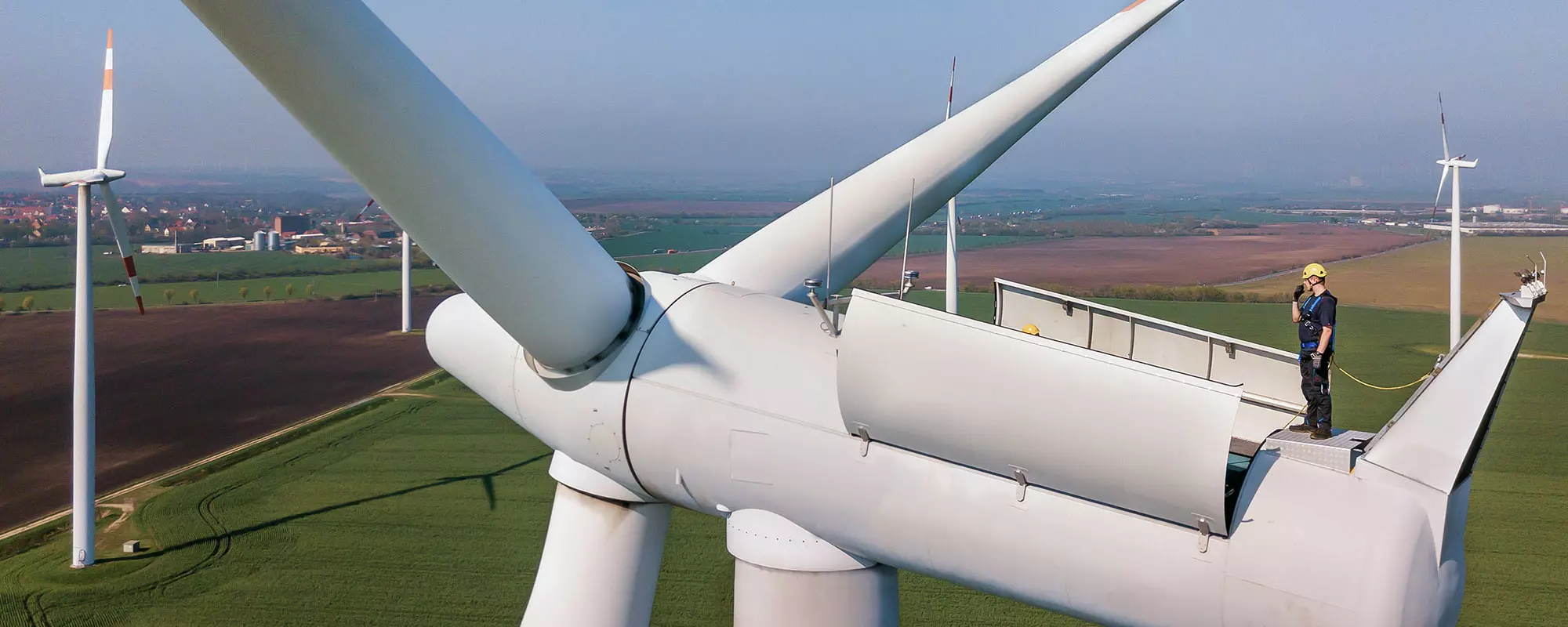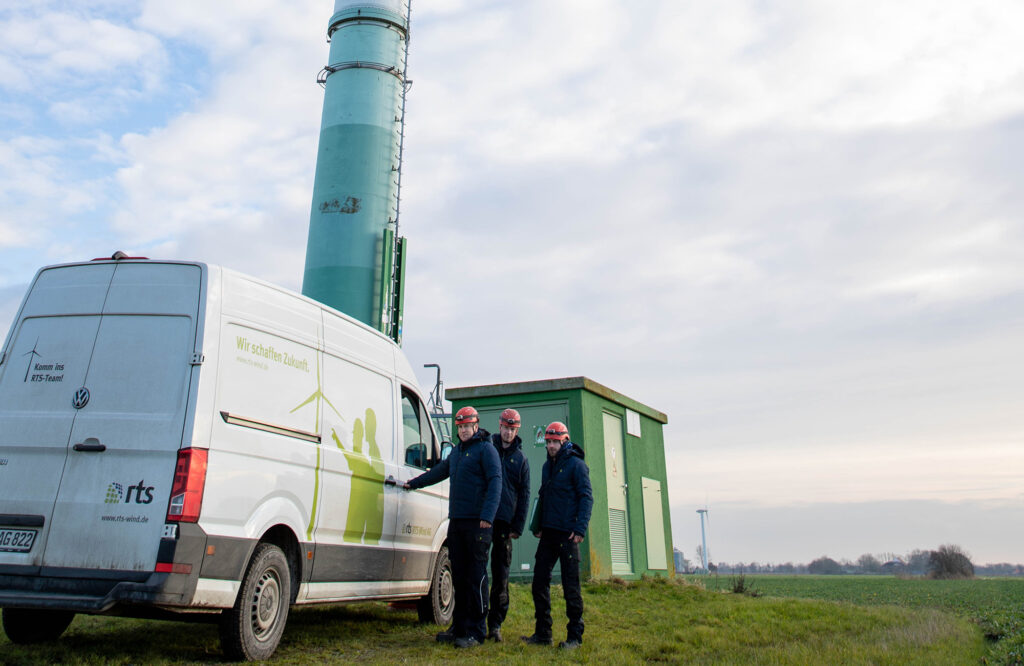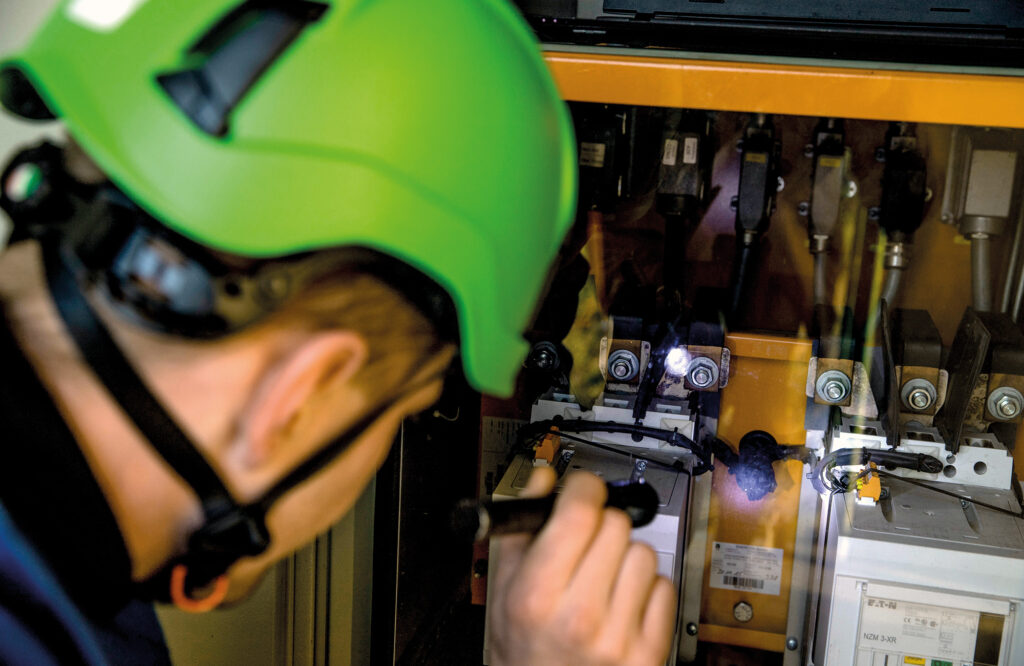
Wind Turbine Technicians / Electricians
In wind power installations, complex electricians are used, which require not only installation but also maintenance. This means that the work takes place both during construction and in operation.
Wind turbine technicians (electricians) are responsible for troubleshooting and preventing disruptions in production and electrical systems. Additionally, they handle the installation of electronic components during construction.
Tasks based on the areas of deployment for wind turbine electricians
Electricians are needed everywhere, including in wind power installations. In this field, they belong to the group of service technicians. They can work both in construction and during ongoing operations. The focus is on electrical and electronic components, while mechanical parts fall under the responsibility of other service technicians. This includes the tower structure and rotor blades. It also encompasses power electronics, generators, and the control and monitoring systems of the turbine.
Wind turbines are subjected to daily stress and wear, with the possibility of spontaneous failures or disruptions. To prevent or address these issues, regular maintenance and inspections are carried out. Repairs are performed when necessary. During construction, electronics technicians are responsible for the installation of electrical components. They also conduct system tests to ensure proper functionality and commissioning.
Typically, electricians for wind turbines can work wherever wind farms are located.
The work takes place outdoors and can be divided into two areas: onshore and offshore.
Wind Turbine Electricians in Onshore Areas
Onshore refers to wind farms located on land. The construction phase depends on the prevailing weather conditions, particularly the wind. During operation, the turbines require regular maintenance and inspections. The current condition of the turbines is documented, and any damages are repaired or worn-out parts are replaced. The biggest influence on turbine operation is the weather, but vandalism can also be a concern. Therefore, occasional cleaning or repair work may be necessary.
Wind Turbine Electricians in Offshore Areas
The term “offshore” refers to wind farms situated at sea, specifically in coastal waters. The environmental conditions can be harsher than on land, with generally stronger winds. Additionally, the presence of salt in the air and water poses a significant challenge. It corrodes the turbines, necessitating more comprehensive maintenance. In offshore areas, technicians work on-site for two weeks before handing over the work to the next team. This requires good coordination and documentation to ensure that any unfinished tasks can be continued.

Career Path
Wind turbine technicians can either directly apply for relevant job openings or acquire additional qualifications beforehand. This is particularly useful because working in wind turbines demands high standards. For example, pursuing further training as a wind turbine service technician is recommended. This training provides the necessary knowledge specific to wind farms.
However, the most crucial aspect is the fact that the work takes place at heights of over 100 meters. Typically, wind turbine technicians ascend the turbine tower using built-in elevators or ladders. However, there are instances where electricians may need to ascend using ropes. Therefore, having additional qualifications as an industrial climber according to FISAT or IRATA is highly valued. Technicians with one of these qualifications can then undertake work from ropes.
Ideally, employees possess both additional qualifications, allowing them to work in the industry without limitations.
Current job offers
No suitable job offer found? No problem, just apply to us anyway!

Requirements and Prerequisites
If you aspire to become an wind turbine technician, you should meet certain requirements. These include both professional demands and personal attributes. In terms of professional requirements, you need to have technical knowledge and manual dexterity. You must understand how the turbines function to adequately care for them. Additionally, you must be capable of quickly and reliably resolving any arising problems. Furthermore, you need to fulfil additional prerequisites, such as reliability and a sense of responsibility.
Regarding the nature of the work as an electrician in wind turbines, it is important to consider teamwork. The work is carried out in teams of two to three individuals who come from different fields of expertise. Electronics technicians typically collaborate with mechanics to cover both areas of specialization. Therefore, the ability to work well in a team is crucial. The tasks vary every day, as conditions can change unexpectedly. Weather fluctuations, unforeseen delays, and similar factors require a flexible approach to work.
Another aspect to consider is that the work takes place at heights of approximately 100 meters. This necessitates basic physical fitness and the ability to work at heights without vertigo. Wind turbine technicians must be free from vertigo to perform their tasks. For those working offshore, being seafaring and not prone to seasickness is also essential.
Furthermore, you must be willing to travel for work since wind farms are not located directly in your vicinity. Those working on wind turbines spend a lot of time on the road. Therefore, having a driver’s license and being able to stay in hotels during the week is necessary, as it is typical for assembly work.

Future prospects for wind turbine technicians with electrical background
The renewable energy industry is experiencing rapid development. The energy transition is in full swing, with wind power being a central pillar. Both onshore and offshore wind energy offer numerous job opportunities and are well-suited for those seeking future-proof careers. Wind turbine electronics technicians have good prospects because the demand for skilled professionals is high. Moreover, possessing a few essential qualities allows for successful career advancement.
To succeed in this field, three personal prerequisites are essential: adaptability, teamwork, and initiative. Unforeseen incidents can occur from one moment to the next, requiring quick decision-making without extensive consultations. All team members must be able to rely on each other to carry out their tasks reliably and safely. Additionally, the industry is constantly evolving, necessitating the ability to adapt to rapid changes.
FAQs about Wind Turbine Electronics Technicians
What is the salary for wind turbine electronics technicians?
The salary for wind turbine electronics technicians cannot be generalized. It varies depending on factors such as work experience, company size, and specific job roles.
What education serves as a foundation for wind turbine electronics technicians?
Any education with an electronic background serves as a foundation for this trade in wind farms. This can include roles such as electronics technicians in industrial engineering, energy and building technology, or mechatronics.